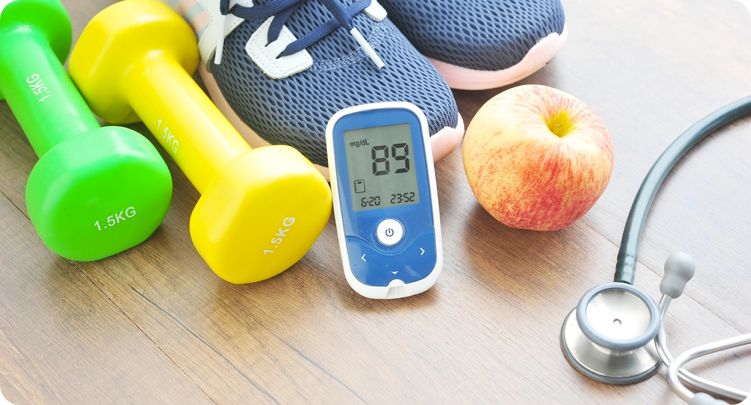Nearly 1 in 4 adults are living with diabetes
Key findings from the National Diabetes Statistics Report say that in 2015, 30.3 million Americans, or 9.4% of the population had diabetes.
7.2 million Americans don't even know they have diabetes.
Are you at risk for Diabetes?

Diabetes - What is it?
Diabetes is known as a group of diseases that result in too much sugar in the blood (high blood glucose). High blood glucose over time damages the inside of blood vessels leading to many complications such as strokes, vision loss, heart attack, kidney damage, nerve damage. It is caused by resistance or inadequate production of insulin. Insulin is a hormone produced by the pancreas that works like a key to open the cells so sugar can enter and be used for metabolism.

Type 1 or Type 2 - What’s the difference?
Type 1 Diabetes
The pancreas is damaged and insulin production is almost nothing. This can be dangerous and should be treated with Insulin therapy. Since production is compromised Insulin must be replaced. Commonly occurs in young children
Type 2 Diabetes
The production of insulin is not enough, or the lock does not fit the insulin key. This is known as Insulin Resistance
Causes
- Family History of diabetes
- African-American, Hispanic, Native American, or Asian- American race, Pacific Islander or ethnic background
- Being overweight is the leading cause of Insulin Resistance and Type 2 Diabetes
- Physical stress (such as surgery or illness)
- Use of certain medications, including steroids
- Presence of some toxins

Prevention - How to prevent Diabetes?
Type 2 Diabetes is a preventable chronic disease. Managing your weight through a healthy diet, exercise and other measures is the best way to prevent the onset of Diabetes.
This is beacause the lokc on the cell membrane that the insulin connects to can be optimized in shape and so able to unlocked by the insulin key.
The sooner we adopt a healthy approach to lifestyle, the more diabetes can be prevented

Manage your Diabetes with our Lifestyle Program
- Lifestyle Program
- Our Lifestyle Program is specifically tailored to...Lorem ipsum dolor sit amet, consectetur adipiscing elit. Phasellus congue iaculis turpis, a aliquet orci. Vivamus maximus vel orci at vestibulum. Phasellus semper urna ac eros lacinia convallis.

Lifestyle
Nutrition
Exercise
Sleep Hygiene
Stress Support
Supplements
Medications
There are different classes of medications. They have different functions and can be paired up to control the blood glucose in our blood
- Increase insulin production:
- Ex. Glipizide
- Increase insulin sensitivity:
- There are several subgroups that can be combined to promote insulin sensitivity.
- Eliminate excess glucose in our urine.
- This is the newest group of drugs
- Replacement therapy –
- Insulin therapy.

Monitoring
There are many blood glucose monitors available. The newer ones can be connected to your smartphone. Your doctor will tell you how often your sugars should be checked.
Always important to check your sugars before a meal or 2 hours after a meal. The target blood sugars vary with age but in general 2 hours after a meal your sugar should be less than 180 and closer to less than 140 in younger patients.

Testimonials
Checkout what our wonderful patients say about us...
Scott has experienced weight loss and has less heartburn symptoms and less joint pain. His highest weight was 245 pounds, he is now at 194 pounds and his current goal is 185 pounds. His A1C started at 10.1 and is currently 6.9. At the highest point his triglycerides were 446 and are currently 203.
Michelle Anderson
I have learned to relax through Dr. Abraham’s Stress Management Program. If I get stressed or start to have heart palpitations my deep breathing and relaxation response comes automatically.
Beatrice F.
Schedule Your Appointment
Start your journey towards good health.
Your journey towards good health starts now.















